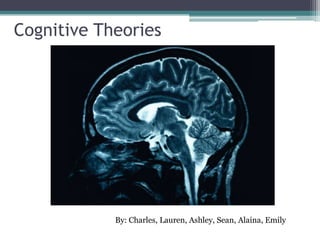
Mod 13
- 1. Cognitive Theories By: Charles, Lauren, Ashley, Sean, Alaina, Emily
- 2. Cognitive(View learning and remembering as a behavior to be studied) Allan Paivio- believes in presenting information both visual and verbal form enhances recall and recognition. Dual coding theory- we process both images and language. Three sub processes- representational, referential, and associative. Possible shortcoming- placed equal emphasis on verbal and non verbal learning. Robert Gagne- worked on cognitive learning hierarchies. Five main categories of learning Verbal Information Intellectual Skills Cognitive Strategies Motor Skills Attitudes Nine Events of Instruction Gain Attention of Learners, Inform Learners of the objective, Stimulate recall of prior learning, Present the stimulus or lesson, Provide learning guidance and instruction, Elicit performance, Provide feedback, Assess performance, Enhance retention and transfer.
- 3. Cognitive(View learning and remembering as a behavior to be studied) Howard Gardner- Developed the multiple intelligences. Linguistic-verbal-has a strong ability with language Logical-mathematical-has a strong ability of reasoning Spatial-visual-has a strong sense of the way things look Body-kinesthetic-has a strong ability in hands on things Musical-has a strong connection with understanding music Interpersonal-has a strong connection with communicating with others Intrapersonal-has a strong connection with oneself Naturalist-has a strong connection with nature Benjamin Bloom- classified learning into three domains Cognitive domain, affective domain, psychomotor domain Blooms taxonomy-six levels Knowledge-learner can recall information Comprehension- learner can predict and explain Application-learner can solve problems and use information Analysis-learner can see patterns and organize information Synthesis-learner uses old ideas to create new ones Evaluation-learner can compare, judge, and value ideas
- 4. Cognitive Load Theory of Multimedia Learning John Sweller: Originator Three types of cognitive load: extraneous cognitive load under the control of instructional designers. This form of cognitive load is generated by the manner in which information is presented to learners. intrinsic cognitive load the idea that all instruction has an inherent difficulty associated with it and this may not be altered by an instructor. germane (effective) cognitive load the load dedicated to the processing, construction and automation of schemas (i.e. organized pattern of thought or behavior) and is encouraged to be promoted.
- 5. Classroom Implications Teachers In this theory, teachers should use germane cognitive load, which is influenced by the instructional designer. It is the teacher’s responsibility to find the best way to present information to students so that they can fully learn and remember material. This may include using technology as a tool, which students are familiar with. Students increases in effort or motivation can increase the cognitive resources devoted to a task. Personal Thoughts: I agree with this theory because it seems that the germane cognitive load would be the most effective out of the three. Teachers really should be able to analyze their students and find effective ways to communicate new information in the best way possible, making learning as easy as possible for the students.
- 6. Albert Bandura Although Bandura is generally a behavioral theorist, towards the end of his career he began identifying himself as a cognitive theorist, a new theory that was just starting to take root. Bandura is often called the father of the cognitivist movement. He is largely famous for his Social Cognitive Theory, which states that people acquire behaviors through observation of others and then imitating what they observed.
- 7. Albert Bandura Cont. Bandura is most well known for his Bobo doll experiment He showed a group of young children a video of an adult beating up a Bobo doll and shouting aggressive phrases. The children were then moved to a play room where there was a Bobo doll. The children began to punch, kick, and jump on the doll and shout at the doll, just like they had seen in the video.
- 8. Albert Bandura Cont. Bandura established that there were steps involved in his modeling process: Attention Retention Reproduction Motivation Past, promised, and vicarious reinforcement Past, promised, and vicarious punishments
- 10. Explains connections with how people interpret/explain causes for failures and success
- 11. Perceptions determine future efforts for success and achievement
- 12. People tend to attribute their own success internally and failures externally but others success as external and failures as internalAlaina
- 14. Students can assume failure due to changeable, controllable factors instead of poor instruction or luck
- 15. In my experience, it’s hard not to blame external factors, such as time restrictions or poor teaching. This theory reminds me of the motion picture He’s Just Not That into You because it displays how women create every explanation except the obvious one to avoid rejection. I could take advantage of this theory by encouraging student effort and insisting good grades come from individual sufficient efforts. I would incorporate the philosophy that every student learns at different paces and project this to my students.Alaina
- 17. Developed by Richard Mayer
- 18. Theory States that “people learn more deeply from words and pictures than from words alone” (Mayer, p. 47)
- 20. There are two separate channels (auditory and visual) for processing information (sometimes referred to as Dual-Coding theory);
- 21. Each channel has a limited capacity
- 22. Learning is an active process of filtering, selecting, organizing, and integrating information based upon prior knowledge
- 24. Online Scavenger hunts for informative Videos
- 25. Mock games centered around Team Q & A with built in video prompts
